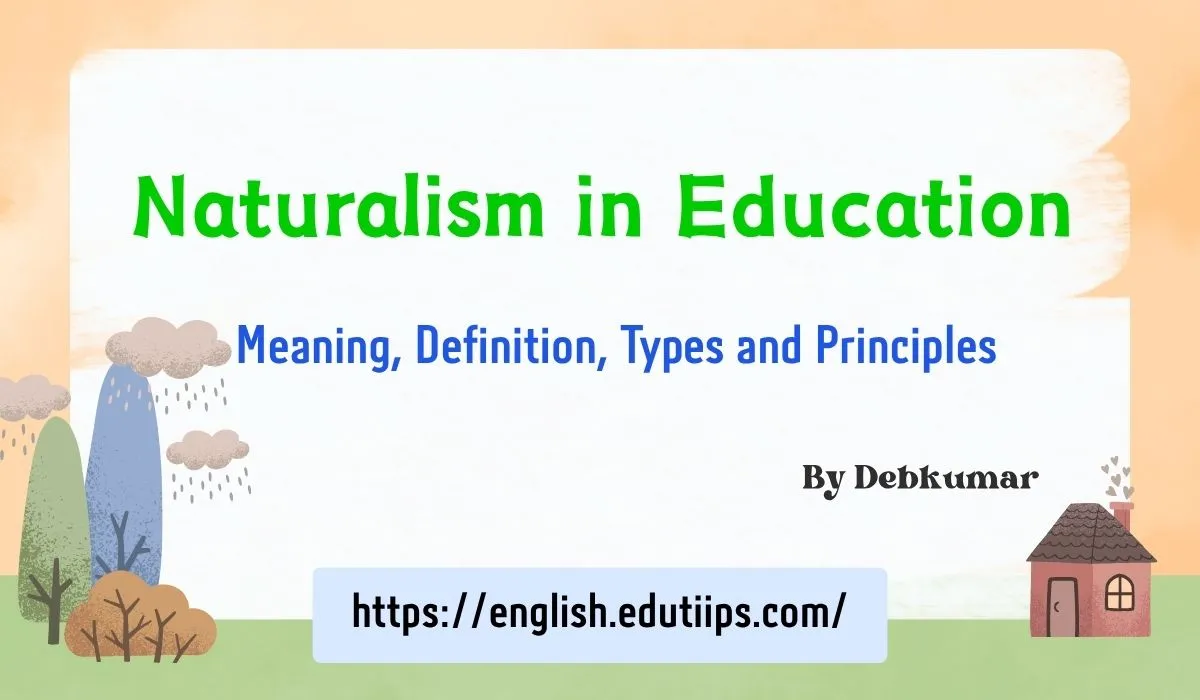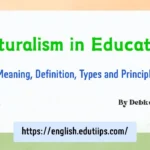Naturalism is the oldest philosophy of the Western world. Explore the philosophy of naturalism in education — its meaning, key definitions, major types, and core principles.
The philosophy of Naturalism in Education emphasizes that nature is the ultimate reality. According to this philosophy, education should be based on the natural development of the child, free from external control or imposed systems. It promotes a learning environment that follows the child’s instincts, interests, and physical development.
Meaning of Naturalism in Education
Naturalism lays emphasis on nature in every field of education. It is a philosophy that considers nature as everything and denies the existence of any spirit.
Naturalism in education is a philosophy that asserts that education should conform to the natural development of the child. It rejects spiritual and supernatural beliefs, advocating for a scientific and empirical approach to teaching and learning.
This philosophy does not believe in the existence of God. The term ‘Nature’ in naturalism stands for the totality of objects and events in space and time.
Protagonists of Naturalism
Western philosopher J.J. Rousseau is considered the champion of naturalism. Rousseau’s famous work “Émile, or On Education” (1762) laid the foundation of naturalistic educational philosophy.
“Everything is good as it leaves the hands of the Author of things; everything degenerates in the hands of man.” — Jean-Jacques Rousseau, Émile
Among the chief exponents of naturalism are Aristotle, Comte, Hobbes, Bacon, Nunn, Darwin, Lamark, Huxley, Spencer, Shaw, Butler, Democritus, Johnson, Tagore, and Neil.
Indian philosopher Rabindranath Thakur.
Summary
- Founder of Naturalism in Education: Jean-Jacques Rousseau
- Work: Émile, or On Education (1762)
- Key Ideas: Child-centered learning, learning from nature, minimal interference by adults.
Definition of Naturalism in Education
The term ‘naturalism’ has been defined by different philosophers and educationists in very clear terms.
“Naturalism is a system of education which is based on the principles of natural growth and development of the child without interference.”
— Rousseau
👉 According to George Hayward Joyee – “Naturalism is a system whose salient characteristic is the exclusion of whatever is spiritual or indeed, whatever is transcendental of experience from our philosophy of nature and man”.
“Naturalism is the doctrine that separates nature from God, subordinates spirit to matter and sets up unchangeable laws as supreme.” – Titus
👉 According to James Ward – “Naturalism is the doctrine that separates nature from God, subordinates spirit to matter and sets up unchangeable laws as supreme”.
👉 According to Rusk – “Naturalism is a philosophical position adopted by those who approach philosophy from purely scientific point of view”.
“Naturalism is a system of thought which regards the world of nature as the only reality.” – James Ward
👉 According to J.S. Ross – “Naturalism is a term loosely applied in educational theory to systems of training that are not dependent on schools and books but on the manipulation of the actual life of the educated”.
So, Naturalism is a system that views man and universe as physical, mechanical, biological and geological.
Types of Naturalism in Education
The naturalists have propounded four forms of naturalism. Let us analyse them briefly here:
Atomistic Naturalism
The atomistic naturalism is the oldest form of naturalism. Epicurus and Democritus are the chief exponents of this philosophy. According to this philosophy, when we go on dividing or discussing a thing, a situation arises when further division or discussion is not possible.
Scientific Naturalism
Scientific experiments prove that heavy and light atoms fall with the same velocity. This type of philosophy of naturalism emerged in the period during which scientific experiments were going on at a fast pace.
Mechanical Naturalism
Sees humans as complex machines. Emphasis is given to stimulus-response and behavior shaping. Herbert Spencer is the main exponent of mechanical philosophy. According to him, the world is like a huge machine that gets its form through matter and motion.
Historical Naturalism
According to this philosophy, human history is the history of man’s struggle on this earth. This philosophy considers that wealth is real and essential for human survival.
Physical Naturalism
Physical naturalism attaches greater importance to the external materials phenomena than the conscious human beings. Focuses on science and the laws of nature. Education must align with biological and environmental realities.
Biological Naturalism
Education should aid in the child’s natural biological and psychological development. Darwin puts forward three principles to explain this philosophy.
Principles Naturalism in Education
Conclusion
Naturalism is the oldest philosophy of the Western world. Naturalism is also known as materialism on the basis of the premise that the universe is matter. It is a materialistic philosophy that has been playing an important role in the field of education.
References
- Aggarwal, J. C., Theory and Principles of Education. 13th Ed. Vikas Publishing House Pvt. Ltd.
- V.R. Taneja, Educational Thoughts & Practice. Sterling Publication Pvt. Ltd. New Delhi
- Nayak, B.K, Text Book of Foundation of Education. Cuttack, Odisha: KitabMhal
- Ravi, S. Samuel, A Comprehensive Study of Education, Fourth Printing-May 2016, Delhi – 110092, ISBN – 978-81-203-4182-1,
- Internet sources
Q – What is naturalism in education
Ans – Naturalism is a metaphysics that considers nature as the whole of reality. It excludes what is supernatural or of another world. It believes that reality and nature are identical and that beyond nature, there is no reality. “The material world is the real world”.
Q. Who introduced naturalism in education
Ans.- Jean-Jacques Rousseau is widely regarded as the pioneer who introduced naturalism in education.
Q. Who propounded naturalism in education
Ans.- Jean-Jacques Rousseau is widely considered the pioneer of educational naturalism.





